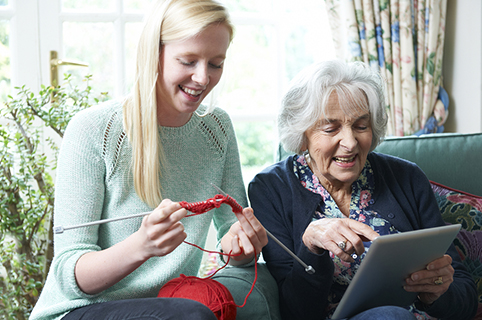 Respite does not always involve formal or organised services. Examples of informal respite include:
Respite does not always involve formal or organised services. Examples of informal respite include:
- a friend or family member accompanying the person with dementia to an activity they enjoy (e.g., watching bowls, going fishing, playing golf)
- a friend or family member staying overnight with the person with dementia while you go away for a holiday or short break.
- a friend or family member staying at home with the person with dementia and allowing you time to relax, go shopping, or undertake other tasks or activities.
- a friend or family member helping with domestic duties around the home.
Organising informal respite
Consider the following when asking someone to provide informal respite:
- What you would like the informal respite to involve (e.g., frequency and duration of respite, activities involved).
- Why you are asking this particular person to provide support (e.g., what characteristics do they have that would make them a good informal support person?).
- Are there any potential barriers which may interfere with organising informal respite this with person. Consider and discuss ways to overcome these barriers.
Lifestyle Strategies
Not all respite strategies need to be pre-organised or involve time away from your loved one with dementia. There are things you can do while you are caring which provide respite from your caring role including:
- Being Mindful
- Reflecting on what you are grateful for
- Developing routines
- Spending quality time with your loved one
- Managing challenging interactions effectively.
Being mindful
Being mindful involves increasing your awareness of present moments without being self-critical or passing judgement. This will increase your awareness of how you feel, think and manage challenging situations, including interactions with the person with dementia.
Reflecting on what you are grateful for
In our busy schedules, we can sometimes forget to appreciate all of the things that make our life happy, satisfying, and meaningful.
Developing routines
Developing daily and weekly routines helps provide a sense of consistency, which is recognized to be beneficial for individuals with dementia.
Ideas for developing routines include:
- Try to keep consistent times for everyday activities such as waking up, mealtimes, bathing, dressing, and bedtime.
- Involve the person with dementia in daily activities where possible. You may need to simplify or modify tasks. For example, the person with dementia may find it difficult to prepare a hot meal but may still be able to prepare their breakfast cereal or lunchtime sandwich.
- You may find it helpful to use cues to orientate your loved one with dementia to different times of the day. ‘Natural’ cues may include opening blinds in the morning to let light in and closing them at night before dinner. You may also develop individualised cues, such as turning on the radio as you prepare breakfast.
- Some carers find it helpful to communicate with the person with dementia about upcoming events (e.g., respite, appointments, visits by family) so the person is prepared and informed. On the other hand, some carers find this can make their loved one feel agitated and/or worried. It may be helpful to experiment with the amount of notice you provide for upcoming events to learn what approach suits the person with dementia the most.
Spending quality time with your loved one
When caring for a person with dementia, a large portion of your time may be taken-up with practical duties such as attending medical appointments and doing domestic duties. It is equally important to make time for meaningful leisure activities together. This may help rejuvenate you in your caring role.
Ideas for ways to spend quality time with the person with dementia:
- Go for a walk together around your neighbourhood
- Spend some time in nature, either in your garden or at a local park
- Play or listen to your favourite music together
- Read a book together
- Spend some quality time with your pet/s
- Look over family photo albums and reminisce
Planned Respite
My Aged Care: 1800 200 422
Carer Gateway
1800 422 737
National Dementia Helpline
1800 100 500

